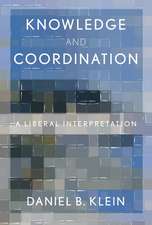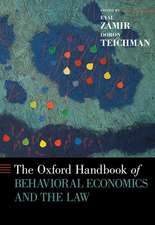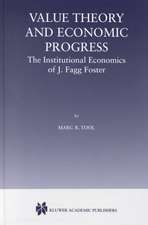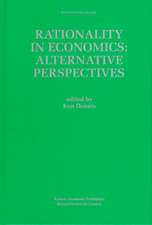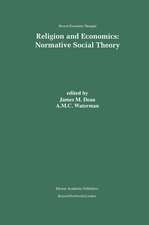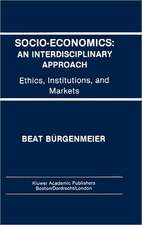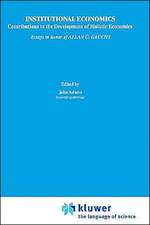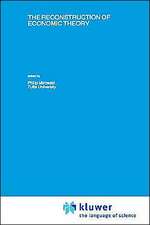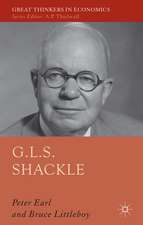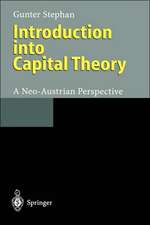Rethinking Economics: From Analogies to the Real World: SpringerBriefs in Economics
Autor Stuart Birksen Limba Engleză Paperback – 8 sep 2014
Din seria SpringerBriefs in Economics
-
 Preț: 444.35 lei
Preț: 444.35 lei -
 Preț: 264.79 lei
Preț: 264.79 lei - 15%
 Preț: 462.51 lei
Preț: 462.51 lei -
 Preț: 47.33 lei
Preț: 47.33 lei -
 Preț: 353.14 lei
Preț: 353.14 lei -
 Preț: 273.32 lei
Preț: 273.32 lei -
 Preț: 376.04 lei
Preț: 376.04 lei -
 Preț: 379.09 lei
Preț: 379.09 lei -
 Preț: 380.07 lei
Preț: 380.07 lei -
 Preț: 377.35 lei
Preț: 377.35 lei -
 Preț: 379.09 lei
Preț: 379.09 lei -
 Preț: 376.59 lei
Preț: 376.59 lei -
 Preț: 408.27 lei
Preț: 408.27 lei -
 Preț: 379.09 lei
Preț: 379.09 lei -
 Preț: 383.27 lei
Preț: 383.27 lei -
 Preț: 378.54 lei
Preț: 378.54 lei -
 Preț: 377.95 lei
Preț: 377.95 lei -
 Preț: 340.23 lei
Preț: 340.23 lei -
 Preț: 380.25 lei
Preț: 380.25 lei -
 Preț: 378.12 lei
Preț: 378.12 lei -
 Preț: 376.04 lei
Preț: 376.04 lei -
 Preț: 376.04 lei
Preț: 376.04 lei -
 Preț: 379.68 lei
Preț: 379.68 lei -
 Preț: 381.00 lei
Preț: 381.00 lei -
 Preț: 375.23 lei
Preț: 375.23 lei -
 Preț: 376.80 lei
Preț: 376.80 lei -
 Preț: 378.54 lei
Preț: 378.54 lei -
 Preț: 377.57 lei
Preț: 377.57 lei -
 Preț: 376.04 lei
Preț: 376.04 lei -
 Preț: 378.92 lei
Preț: 378.92 lei -
 Preț: 375.62 lei
Preț: 375.62 lei -
 Preț: 379.09 lei
Preț: 379.09 lei -
 Preț: 353.67 lei
Preț: 353.67 lei -
 Preț: 342.14 lei
Preț: 342.14 lei -
 Preț: 375.45 lei
Preț: 375.45 lei -
 Preț: 379.09 lei
Preț: 379.09 lei -
 Preț: 344.86 lei
Preț: 344.86 lei -
 Preț: 377.35 lei
Preț: 377.35 lei -
 Preț: 345.89 lei
Preț: 345.89 lei -
 Preț: 377.57 lei
Preț: 377.57 lei -
 Preț: 343.83 lei
Preț: 343.83 lei -
 Preț: 378.12 lei
Preț: 378.12 lei -
 Preț: 345.06 lei
Preț: 345.06 lei -
 Preț: 379.48 lei
Preț: 379.48 lei -
 Preț: 379.48 lei
Preț: 379.48 lei -
 Preț: 380.07 lei
Preț: 380.07 lei -
 Preț: 375.45 lei
Preț: 375.45 lei -
 Preț: 445.33 lei
Preț: 445.33 lei -
 Preț: 378.54 lei
Preț: 378.54 lei
Preț: 377.35 lei
Nou
Puncte Express: 566
Preț estimativ în valută:
72.22€ • 74.43$ • 60.98£
72.22€ • 74.43$ • 60.98£
Carte tipărită la comandă
Livrare economică 03-17 martie
Preluare comenzi: 021 569.72.76
Specificații
ISBN-13: 9789812871756
ISBN-10: 9812871756
Pagini: 75
Ilustrații: XII, 87 p. 2 illus.
Dimensiuni: 155 x 235 x 12 mm
Greutate: 0.16 kg
Ediția:2015
Editura: Springer Nature Singapore
Colecția Springer
Seria SpringerBriefs in Economics
Locul publicării:Singapore, Singapore
ISBN-10: 9812871756
Pagini: 75
Ilustrații: XII, 87 p. 2 illus.
Dimensiuni: 155 x 235 x 12 mm
Greutate: 0.16 kg
Ediția:2015
Editura: Springer Nature Singapore
Colecția Springer
Seria SpringerBriefs in Economics
Locul publicării:Singapore, Singapore
Public țintă
ResearchCuprins
Preface.- Acknowledgements.- Chapter 1: The importance of rhetoric and framing.- 1.1: Three paths.- 1.2: Rhetoric and framing.-1.2.1: Rhetoric.- 1.2.2: Framing.- Chapter 2: Logical gaps: Path A – Theory to the real world.- 2.1: What is theory?.- 2.2.: Limits of theory.- 2.2.1: Perfect competition and counterfactuals.- 2.2.2: Accepting or rejecting a theory.- 2.2.3: Evidence consistent with theory.- 2.2.4: An additional consideration: the importance of groups.- 2.3: Conclusions.- Chapter 3: Logical gaps: Path B - Theory to empirical formulations.- 3.1: Data problems.- 3.1.1: Aggregation.- 3.1.2: Proxies.- 3.1.3: More on indices.- 3.2: Functional forms.- 3.2.1: Controlling for other factors.- 3.2.2: Causality.- 3.2.3: Structural stability.- 3.3: Conclusions.- Chapter 4: Logical gaps: Path C – Empirical results to the real world.- 4.1: Using statistics for policy.- 4.1.1: The research phase.- 4.1.2: The media phase.- 4.2: Consideration of the problems.- 4.2.1: Interpretation of statistical significance.- 4.2.2: Interpretation: why not change the relationship?.- 4.3: There are standard policy questions not covered by the econometrics.- 4.3.1: An example – TV watching and attention problems.- 4.3.2: Policy questions.- 4.4: An additional example: advantage and disadvantage.- 4.5: Conclusions.- Chapter 5: A way forward.- 5.1: An example: efficiency in economics research.- 5.2: A broader context.- 5.3: In a nutshell.- 5.4: And a final word.- Appendix.- References.
Notă biografică
After studying mathematical economics and econometrics, Stuart worked as an economist in multi-disciplinary teams undertaking regional strategic planning. He then returned to the academic world, specializing in applying economics in relation to land, health, education, social policy and law. His experience in cross-disciplinary work combined with an interest in broader methodological issues provided insights other than those afforded by a conventional academic within-discipline perspective. This blended well with his teaching, which has focused on graduate-level courses, many of which have been to mature students with professional experience in a wide range of areas. He has been recognized with Life Membership of the New Zealand Association of Economists and an award of Fellow of the Law and Economics Association of New Zealand.
Caracteristici
Takes a broad-based approach to economics Opens the door to pluralist perspectives Addresses philosophical and methodological issues Highlights the limitations of conventional techniques Relevant to both academics and practitioners Includes supplementary material: sn.pub/extras


